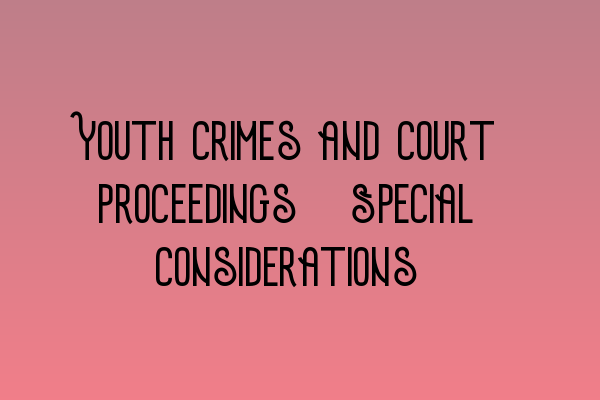Youth Crimes and Court Proceedings: Special Considerations
When it comes to youth crimes and court proceedings, special considerations must be taken into account. This is because the criminal justice system recognizes that young offenders are different from adult offenders and require a different approach. In this blog post, we will explore some of the key considerations that need to be addressed when dealing with youth crimes and court proceedings.
Understanding the Age of Criminal Responsibility
One of the foundational aspects of youth crimes is the age of criminal responsibility. In the United Kingdom, this age is set at 10 years old. It means that children under the age of 10 are not considered capable of committing a crime. However, children aged 10 to 17 can be held accountable for their actions, albeit with a different legal framework.
It is important to understand this distinction when dealing with youth crimes, as it affects the way the case is handled in court. The court must consider the age and maturity of the young offender when determining their guilt or innocence, as well as the appropriate sentencing.
Special Court Procedures for Youth Cases
When dealing with youth crimes, the court proceedings are different from adult cases. The Youth Court handles cases involving young offenders, and it operates under a set of special procedures designed to address the unique needs of youth offenders.
One key aspect of the Youth Court is that it aims to promote the welfare of the young offender. This means that the court will consider the best interests of the child throughout the proceedings, taking into account factors such as their age, maturity, background, and any special needs they may have.
The court also emphasizes rehabilitation rather than punishment for young offenders. This means that the focus is on addressing the underlying issues that may have contributed to the criminal behavior and providing support and guidance to prevent reoffending.
The Role of Youth Offending Teams
In youth cases, Youth Offending Teams (YOTs) play a crucial role in the criminal justice process. YOTs are multi-agency teams made up of professionals from various disciplines, such as social workers, probation officers, police officers, and educational professionals.
The main purpose of YOTs is to assess the needs of young offenders and develop appropriate intervention programs. These programs aim to address the factors that contributed to the offending behavior and provide support to help the young person integrate into society and lead a law-abiding life.
Working closely with the young offenders and their families, YOTs coordinate the delivery of various services, such as counseling, education, training, and employment opportunities. They also monitor and report the progress of the young person to the court, which helps inform the sentencing decision.
Importance of Legal Representation for Youth Offenders
Just like adult offenders, youth offenders have the right to legal representation during court proceedings. Engaging the services of a skilled solicitor who specializes in youth crimes is crucial to ensure the young person’s rights are protected and their best interests are advocated for.
A knowledgeable solicitor can provide guidance and support throughout the process, explaining the legal options and potential consequences to the young person and their family. They can also argue for alternative measures to custody, such as community service, restorative justice, or educational programs, which can be more beneficial for youth offenders in terms of rehabilitation and reintegration.
Conclusion
Dealing with youth crimes and court proceedings requires special considerations due to the unique needs and circumstances of young offenders. Age of criminal responsibility, special court procedures, the role of youth offending teams, and the importance of legal representation are all key factors to take into account when dealing with youth crimes.
For aspiring solicitors who wish to specialize in criminal law, it is essential to have a deep understanding of these special considerations. You can find helpful study materials and resources for the Solicitors Qualifying Examination (SQE) on our website:
- SQE Exam Prep: Essential Study Materials for Aspiring Solicitors
- Demystifying the Solicitors Qualifying Examination Format
- SQE Exam for International Lawyers: Challenges and Success Strategies
Additionally, if you are interested in learning about LLC formation for UK entrepreneurs, we have comprehensive guides available:
- LLC Formation Made Simple: Step-by-Step Guide for UK Entrepreneurs
- LLC Formation: A Step-by-Step Guide for UK Entrepreneurs
Armed with the knowledge of the special considerations involved in youth crimes and court proceedings, solicitors can effectively represent young offenders and contribute to their successful rehabilitation and reintegration into society.
